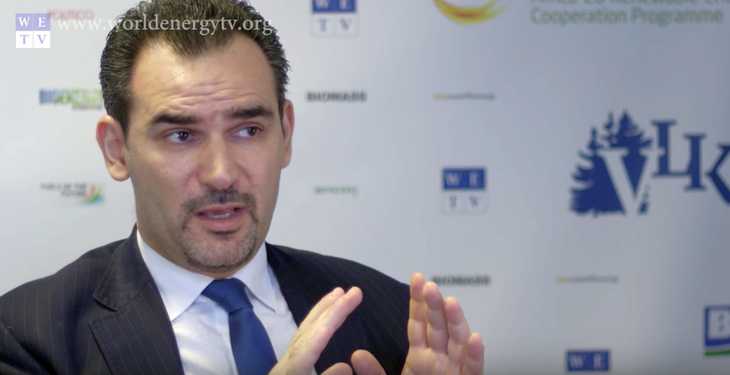There are European directive asking Romania to radically reduce the waste volumes left in landfill, otherwise the penalties can be up to 180 million per year. Ilias Papageorgiadis, president of the Romanian Association of Biomass and Biogas (ARBIO) proposes the money which is payed by polluters and collected in the environmental fund to be used in supporting the bioenergy projects, presented as solution for the environment problem, and for efficient covering the thermal energy needs of Romania. Ilias Papageorgiadis presented this new approach in an extensive interview he gave to World Energy TV, the leading online TV channel for low carbon, sustainable and future energy sources. SEE THE FULL INTERVIEW.
Ilias Papageorgiadis insisted on the fact that biomass is more than renewable: „it is tens of other things apart”. Biomass solves many big environmental problems, it helps you hire tens of thousands of people, it interferes in the lives of people, it offers low cost heating. Biomass would also help in making use of the 500.000 hectares of non-productive land in Romania and also in solving the huge problem of waste: more than ten millions of tons of municipal waste, other five million from the supermarkets, and about the same amount from other sources and producers.
An analysis realised by ARBIO shows that, for countries like Bulgaria, Bosnia Herzegovina, Greece and Romania, it is impossible to have bioenergy without subventions. The main reason is that, at present, the carbon taxes are very low and the coal is very heavily subsidized, which makes impossible any competition.
An analysis realised by ARBIO shows that, for countries like Bulgaria, Bosnia Herzegovina, Greece and Romania, it is impossible to have bioenergy without subventions. The main reason is that, at present, the carbon taxes are very low and the coal is very heavily subsidized, which makes impossible any competition.
„We have come with a proposal to the Romanian government and this has been advanced in the Romanian Parliament”, said Papageorgiadis. „We expect now, after elections, to move and finalize the project. […] So that’s what we say: identify the source of money in the environmental fund, where money is collected from polluters, and bioenergy will come with a solution.”
Papageorgiadis also mentioned another source of financing: „There is the European directive saying that by 2020 less than 50% of waste has to be left in landfill, otherwise the penalties can be up to 500.000 euros per day, 180 million per year, let’s say 200 million. The same amount of money that will be the penalties, we are asking to receive in order to resolve the problem. By implementing this project, we resolve the problem, we avoid the penalties and we create a healthy scheme for investors and for society, also.
„What we say is that we have identified the source that can help us finance 300 MW of power and up to 1.000 MW of heat”, explains Papageorgiadis. How would such a scheme function?
Firstly, there are money from the polluters.
Secondly, there will be not an open scheme, but one connected to the priorities of Romania. „First comes, first served”, inside a capped generation capacity – „let’s say 300 MW”, with different tariffs: smaller for producing just power, and higher for those who will produce cogeneration of high efficiency, or for those who will use as fuel the sorted municipal waste, the biodegradable part of the municipal waste, and also for those who will use energy crops as fuel.
Some studies made by ARBIO showed that there are 25 counties in Romania which produce about 80% of waste, so 35 to 40% of the support scheme should be directed to those areas, for projects that will resolve the problem of waste.
More info and debates on the matter will happen on February 21st!

Thirdly, the income would be connected to the market, said ARBIO president. „Let’s say that today the price of electricity is here and the subvention is here; if the price of electricity goes up, the subvention will go down, because, in the end of the day, if electricity is more expensive we don’t need more money from subventions.”
Proposal for debate
The renewable sector in Romania has rapidly developed in recent years, based on a generous subsidy scheme financed by the end-consumer, through green certificates introduced in the bills. Subsidies encouraged the installment of significant new electricity generation capacities from wind and solar, but close to none in biomass. Facing heavy impact on the consumers, the authorities changed the support scheme, and now, the market has almost stopped functioning, as a huge flood of unsold certificates put hundreds of small producers close to bankruptcy. What if not the consumer would be summoned to pay for renewable power, but the polluter?
Send us your opinion at office @ energynomics.ro!
On short, ARBIO’s proposal is this: pollution is the problem, and the polluters pay for the harm they do to environment; the money is collected in the environmental fund, and from there it should go to bioenergy, as bioenergy provides the solution for the problem. No pressure on the consumers, and a clearly more predictable source of financing for energy producers that solve the environmental problems.

